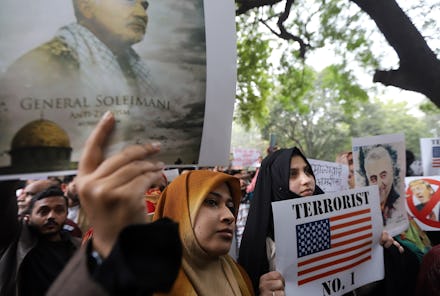Will Trump tweet us into war? Everything you need to know about the Soleimani fallout

From the beginning of his presidency, many have foretold that Donald Trump would tweet America into war. But at present, that possibility seems increasingly likely — literally. After ordering the drone strike assassination of Iranian Gen. Qassem Soleimani, Trump has continued to make bellicose threats, while Iran has promised retribution for the death of one of its foremost military figures.
According to Trump and other American officials, Soleimani was assassinated because he’d ordered attacks on Americans in Iraq and Syria. Soleimani was the leader of the Quds Force, a powerful unit in Iran’s military. Iran’s leaders have threatened retaliatory strikes in response to his death. According to Iranian state media, millions of people gathered for Soleimani’s funeral in Tehran over the weekend, chanting “death to America” and mourning the general.
“God the almighty has promised to get his revenge, and God is the main avenger,” announced Soleimani’s successor as the leader of the Quds Force, Esmail Ghaani, according to The New York Times. “Certainly actions will be taken,” he said.
At the funeral, Soleimani’s daughter Zeinab reportedly delivered a harsh eulogy. “You crazy Trump, the symbol of ignorance, the slave of Zionists, don’t think that the killing of my father will finish everything,” she said.
Trump has fueled the escalating rhetoric with a series of threats he tweeted out over the weekend. “Let this serve as a WARNING that if Iran strikes any Americans, or American assets, we have targeted 52 Iranian sites (representing the 52 American hostages taken by Iran many years ago), some at a very high level & important to Iran & the Iranian culture, and those targets, and Iran itself, WILL BE HIT VERY FAST AND VERY HARD. The USA wants no more threats!,” he wrote Saturday. He then declared that his "media posts" served as "official" notice to Congress of possible U.S. military action.
Speaking to reporters aboard Air Force One, Trump doubled down on his threats. “They’re allowed to torture and maim our people,” he said. “They’re allowed to use roadside bombs and blow up our people. And we’re not allowed to touch their cultural site? It doesn’t work that way.”
Targeting cultural heritage sites is considered a war crime under international law. Iranian Foreign Minister Javad Zarif responded harshly to Trump’s comments on Twitter, noting that ISIS has also made a habit of targeting historical sites.
“A reminder to those hallucinating about emulating ISIS war crimes by targeting our cultural heritage: Through MILLENNIA of history, barbarians have come and ravaged our cities, razed our monuments and burnt our libraries,” he wrote. “Where are they now? We’re still here, & standing tall.”
And speaking of ISIS, Trump’s lethal strike had the ancillary effect of the U.S.-led coalition against the terror group pausing its efforts in its ongoing fight. In a statement, the coalition made clear that it would be ceasing the fight in order to protect itself for the time being; American troops abroad are now focused on fortifying their positions in anticipation of a possible retaliatory attack from Iran. “We remain resolute as partners of the government of Iraq and the Iraqi people that have welcomed us into their country to help defeat ISIS,” the statement read, adding, “We remain ready to return our full attention and efforts back to our shared goal of ensuring the lasting defeat of Daesh.”
The move shredded diplomatic progress, too. In the aftermath of Soleimani’s death, Iran announced that it would be ending all restrictions on production of nuclear fuel. This effectively abolishes the 2015 nuclear agreement that President Barack Obama struck with Iran, which capped Iran’s nuclear production for 15 years in exchange for lifting some economic sanctions. Trump withdrew the United States from the deal a year ago, but Iran had continued to restrict its production of bomb-grade fuel. Now, the country has effectively declared those limits to be over, announcing that it will build as many centrifuges enrich the fuel to any level that it wants.
Zarif said on Twitter that the country will continue to allow inspectors from the International Atomic Energy Agency to observe its fuel enrichment sites — a key tenet of the 2015 deal that ensured the international community had a certain level of transparency about Iran’s nuclear development. The Times notes that it’s unclear whether Zarif meant Iran would hold to the more stringent requirements of the 2015 deal, or the looser scrutiny agreed to under previous international precedent for nuclear nations.
Further complicating the picture is a new report indicating that, although he’s largely been described as a military leader responsible for violence across the Middle East, Soleimani may have been playing a key role as a backchannel between Iran and Saudi Arabia, working to reduce tensions throughout the Middle East. In a speech Sunday, Iraqi Prime Minister Adil Abdul Mahdi said that he was supposed to meet with Soleimani the day he was assassinated.
“It was expected that he was carrying a message for me from the Iranian side responding to the Saudi message that we had sent to the Iranian side to reach agreements and breakthroughs important for the situation in Iraq and the region,” Mahdi said, per the Times.
Meanwhile, Iranian-Americans reported being detained by U.S. Customs and Border Patrol over the weekend and asked extensive questions about their personal history despite their citizenship status. And on Monday, the chief of staff to Defense Secretary Mark Esper announced he'd leave his post at the end of the month.
The Soleimani assassination may well spark conflict throughout the Middle East, and not just between the United States and Iran. It will likely take a while for the consequences of Trump’s lethal actions to become fully clear, but they will certainly resonate for a long time to come.